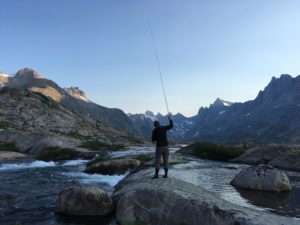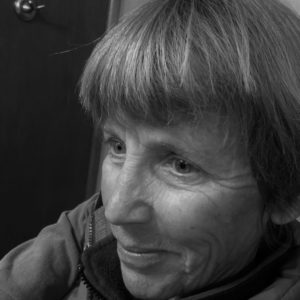 The poet Jane Hirshfield writes, “A world—or book—that is felt to contain the hidden is inexhaustible to the imagination.” Poetry is the subject at hand, but she might as well be talking about fishing. Or about my father when she writes, “Hiddenness is the ballast in the ship’s keel, the great underwater portion of a life that steadies the rest.”
The poet Jane Hirshfield writes, “A world—or book—that is felt to contain the hidden is inexhaustible to the imagination.” Poetry is the subject at hand, but she might as well be talking about fishing. Or about my father when she writes, “Hiddenness is the ballast in the ship’s keel, the great underwater portion of a life that steadies the rest.”
I took up fishing in order to get to know my father. We used to stand in frigid Vermont rivers fly fishing for trout. The sun wasn’t up yet and breakfast was hours away, but there we stood, catching nothing and mostly enjoying it. We fished in the White, the Black, the Green, the Tweed, the Winooski. We fished in high mountain streams in Wyoming and in the cold waters of the Rio Colorado. The names of the rivers, elegant or plain, excited me. The grandeur of those waters varied tremendously, yet each encounter with the possibility of touching life below the surface gave a lift to my heart.
And my dad, in his clunky waders and Orvis vest, became more real to me each morning we got in the car and made our silent way across town or state lines to the nearest fishable river. The life he so carefully contained below his placid, capable surface began to show itself. I felt I knew him in a way no one else in the family did, not because we became different people when we fished but because we were more ourselves.
The night before a fishing morning I’d put my rod in the car and talk to Dad about the flies we’d use. He’d bring a creel and a net, along with a beautiful bamboo rod given to him by his father. We’d leave the house early, long before dawn, Dad’s thermos of coffee on the seat between us. He’d fiddle with the radio even though there was nothing to hear but static. After that we’d sit in silence. Sometimes he’d reach for the thermos and I’d say, “I’ll do it, Dad,” and pour him a cup of coffee.
Our house was busy and noisy, full of the constant competition of five opinionated kids. It was a brand new pleasure to sit quietly with someone I was related to, and Dad seemed to like it as well. Fathers were different then. They said little and expected much, though the sum of those expectations was seldom clear. On fishing mornings, as we rattled along in the Rambler, the only expectations in the air were that we’d cast our lines out and reel them in, cast out and reel in. Habit took the place of judgment or hope, and around these simple motions of the arm casting out and the body reeling in we built a tradition of relaxed enjoyment.
Dad’s father was a legendary fisherman who traveled all over the world. He particularly liked salmon fishing in Iceland. One day, before I got the fishing bug, we made a rare visit to him in the western part of Connecticut. Grandpa’s house was old and creaky, with a few small bedrooms upstairs under the eaves. That’s where we would have spent the night if he and my father were on more intimate terms, but there always seemed a formality to their relationship. So we spent the day with him but said goodbye in the afternoon. We said we were going to drive home but in fact we checked into a motel right off the thruway.
Earlier that afternoon, with the wind blowing slightly less than a gale, Grandpa got it into his head that it was time to bond with me and we’d do so through fly fishing. He decided to teach me to cast, and he decided the best place for this was out under the huge maples that surrounded the house. I was able, once or twice, to set down an imaginary fly on an imaginary fast-flowing stream but mostly, over and over again, my fishing line flew into the trees and tangled there. Too windy, said Grandpa at last, unable to hide his disappointment. We went into the house together and I sensed that had been my only chance to make his acquaintance, and I had failed.
My father and I never really trusted each other before we went fishing together. We knew nothing about the workings of silence and how it lays down a layer of familiarity that sings in the back of the throat. And up the arms. And into the chest. In short, we loved each other and had not known how to know it. But standing within the same quarter-mile in a thigh-deep boiling river, or at the edge of a quiet pool, and sometimes hauling a holy unseen secret out from below the still or roiling surface, shouting our good luck—this changed us. It was just the right amount of intimacy. For two people, shy with each other, it was not too much to bear. And we had the company of the brookies, the rainbows, the river and its tangled banks.
Recently, reading the words of Vincent Randall, a Dilzhe’e Apache gentleman, I thought immediately of fishing. He wrote, “Big Mountain is one of the sacred places where the Earth brushes up against the unseen world.” He was talking, of course, of what in English we call the San Francisco Peaks, rising into the sky. To me, the world below the waters is twin to the world above the clouds. It’s a holy mystery most of the time. It’s the sky kneeling down in prayer.
When it came time to settle my father’s ashes, I took my share of him to Mooselookmeguntic Lake, a great body of water where as a boy he’d accompanied his father out in a boat on chilly mornings while Grandpa fished for landlocked salmon. Dad reported the boredom of those mornings, and the cold that seeped into his bones. He was 6 or 8 years old, not yet a fisherman, just a little boy prone to motion sickness. And when I paddled out onto the lake that foggy morning and poured his ashes onto the still surface that 80 years before might have reflected his own young face, I felt as close to him as I ever had, as close as when we stood upstream and down, just within sight of each other, fishing in the early light.
Margaret Erhart is a writer, teacher, traveler and landlady. Some of her favorite work has been as an artist-in-the-schools in Tuba City, as a firefighter and as a Grand Canyon hiking guide. She is the author of five novels and has published essays in a variety of magazines. To find out more about her work, take a look at www.margareterhart.com.

